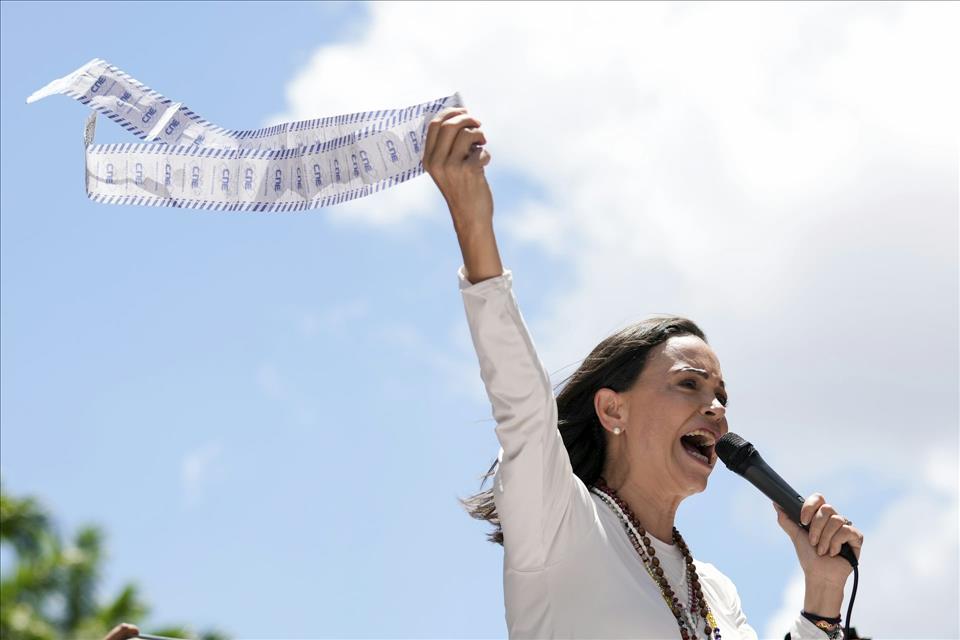
A Pro-Democracy Venezuelan Politician Wins This Year's Nobel Peace Prize. Is It A Rebuke To Trump?
In the end, however, the committee signalled its efforts to uphold the increasingly threatened liberal international order by selecting Machado , one of Venezuela's key opposition figures and a proponent of democracy.
The politics of the prizeThe Nobel Peace Prize, like most international awards, is highly subjective. In some years the winners may appear obvious, such as in 1994 when Yasser Arafat, Yitzhak Rabin and Shimon Peres shared the award for the Oslo Accord, but in other years, it's not so clear; 2025 is one such year.
This ambiguity has given rise to many people and organizations angling for the award.
Barack Obama poses with his medal and diploma at the Nobel Peace Prize ceremony at City Hall in Oslo in December 2009. (AP Photo/John McConnico)
In 2025, United States President Donald Trump made a concerted and high-profile push for the award to cement his dubious legacy. Although many people found his demands for the award laughable, there is precedent for politics overstepping the reality of an individual's contribution.
U.S. President Barack Obama received the 2009 Nobel Peace Prize for “extraordinary efforts to strengthen international diplomacy and co-operation between peoples.” But in reality, Obama had accomplished little to justify the award at that point of his political career just a year into his historic presidency.
Instead, the best justification that the committee chairman could offer was “we want to embrace the message that he stands for.”
In the case of Machado, the Nobel Committee chose to endorse both a message as well as actions.
Declining democracy in VenezuelaDemocratic rights in Venezuela have declined significantly over the last two decades. Initially, people greeted the election of Hugo Chávez in 1998 as a significant break from the corruption and economic crisis that defined Venezuelan politics in the 1990s. They were wrong.
Venezuelan President Nicolás Maduro speaks during a news conference in Caracas in September 2025. (AP Photo/Ariana Cubillos)
Once Chávez rose to power, his regime became increasingly authoritarian over time. The complete pivot to authoritarianism in Venezuela, however, happened after Chavez's death under his successor, Nicolás Maduro, who assumed the presidency in 2013.
By 2016, outside observers argued that Maduro's efforts to centralize power for himself constituted a “full-on dictatorship.” Despite several nominal elections since that time, Maduro has used a variety of tactics in order to guarantee he and his regime remain in power.
The Maduro regime's tactics range from digital censorship to threats in the face of protests and outright violence. The people of Venezuela, in short, are far from free.
A champion for democracyThe tactics used by Maduro's government to suppress the opposition means it requires considerable personal bravery and integrity to challenge the regime. Machado possesses such traits.
She's faced considerable threats to her life throughout her political career. Starting in 2011, Machado was physically attacked by Chavez supporters. These attacks have escalated since Maduro assumed power.
While many of her fellow politicians have fled the country fearing such threats of violence, Machado has remained in the country and become a symbol of defiance and democracy for the opposition. Even though her centre-right views are not in alignment with much of the Venezuelan opposition's political stances, she was nevertheless chosen to be the unity candidate in the 2024 Venezuelan presidential election.
Maduro's government, fearing her appeal as a candidate, ultimately barred her from holding office .
Venezuelan opposition leader Maria Corina Machado addresses supporters during a protest against President Nicolas Maduro the day before his inauguration for a third term in Caracas, Venezuela, in January 2025. (AP Photo/Ariana Cubillos) Champion of a failing order
Machado's personal bravery in the face of threats from the Maduro regime also highlights another matter the Nobel Prize committee seeks to highlight: the declining state of democracy at an international level.
Democracy is regarded by many as a foundational pillar for peace . The Nobel Prize committee is among them.
In awarding the 2025 Nobel Peace Prize, the committee noted :
Most analyses suggest that liberal democracy is in decline at an international level. Whether through the development of hybrid regimes or outright authoritarian governments , democracy as both a concept and a practice is under threat.
Trump's second stint in the Oval Office seems to vividly illustrate this decline. The U.S. president and his supporters have been quite explicit that their priority is“America First.” The U.S., which previously served as a champion of the liberal international order on the global stage, is anything but at the moment.
Furthermore, Trump's domestic actions domestically that threaten the basis of democratic governance will undoubtedly embolden other politicians to pursue similar policies.
With the world's traditional champion of democratic governance in retrenchment, other pro-democracy forces are stepping into the breach - including the Nobel Committee and its selection of Machado for the 2025 Nobel Peace Prize.

Legal Disclaimer:
MENAFN provides the
information “as is” without warranty of any kind. We do not accept
any responsibility or liability for the accuracy, content, images,
videos, licenses, completeness, legality, or reliability of the information
contained in this article. If you have any complaints or copyright
issues related to this article, kindly contact the provider above.
Most popular stories
Market Research

- Crypto Market Update: Pepeto Advances Presale With Staking Rewards And Live Exchange Demo
- Kucoin Appeals FINTRAC Decision, Reaffirms Commitment To Compliance
- Cregis And Sumsub Host Web3 Compliance And Trust Summit In Singapore
- Chartis Research And Metrika Release Comprehensive Framework For Managing Digital Asset Risk
- Nodepay Launches Crypto's Largest Prediction Intelligence Platform
- Schoenherr Opens London Liaison Office As Gateway To Central Eastern Europe




















Comments
No comment